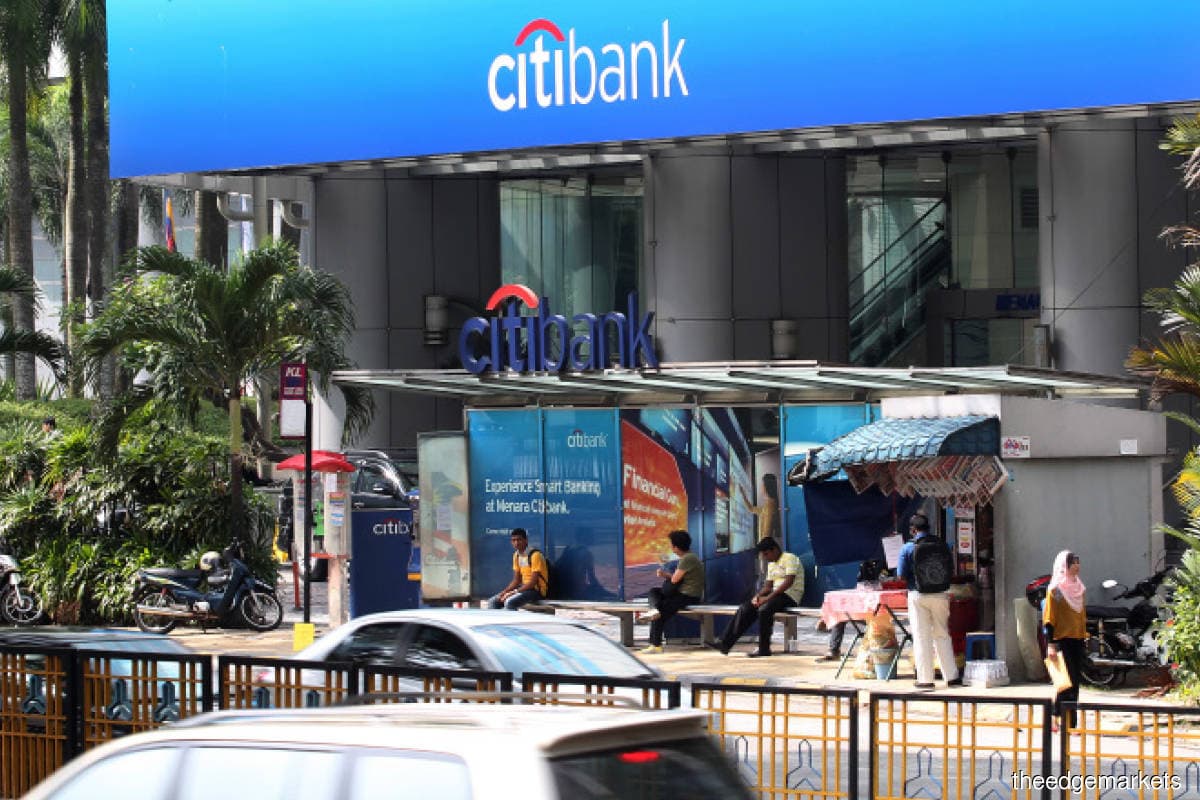
This article first appeared in The Edge Malaysia Weekly on September 27, 2021 - October 3, 2021
BINDING bids for Citigroup Inc’s (Citi) consumer banking assets in Malaysia and a few other markets in Asia are expected by the end of the month, industry sources say.
The lenders that remain interested in acquiring Citi’s consumer banking business in Malaysia include UOB Group, the Standard Chartered banking group and Hong Leong Bank Bhd, according to several sources.
“The Malaysia asset is one of the highly sought-after ones. Binding bids are due at end-September — so, basically, it’s [this] week,” a source with knowledge of the matter tells The Edge. “Citi’s wealth proposition in Malaysia is compelling and the credit card business is very attractive … that’s what most of the banks are after.”
Citi Malaysia’s consumer business comprises credit cards, wealth management and mortgages.
Citi Investment Bank is understood to be running the sale process out of Hong Kong.
Sources say HSBC, OCBC and Malaysia’s top two local lenders, Malayan Banking Bhd (Maybank) and CIMB Group Holdings Bhd, are not among those in the race for Citi’s assets.
When contacted, OCBC Bank (Malaysia) Bhd CEO Datuk Ong Eng Bin says the bank wants to grow its consumer business organically, in keeping with its current strategy, reiterating what he said in an interview last month.
In contrast, UOB Group and Standard Chartered have indicated a willingness to expand via acquisitions, when asked in recent months about their interest in Citi’s consumer assets in Asia.
UOB Group deputy chairman and CEO Wee Ee Cheong said in May that UOB was always open to acquisition opportunities as long as it was “a strategic fit, at the right price and makes sense for the long term”. A UOB spokesperson told The Edge last week that the bank had no further comment.
Standard Chartered Malaysia managing director and CEO Abrar A Anwar tells The Edge that the bank “continuously evaluates opportunities across its markets” to grow its retail business in a way that is sustainable, cost-efficient and scalable.
Hong Leong Bank did not respond to an email seeking comment. Citi declined comment for this story.
US-based Citi had on April 15 announced that it would exit consumer banking in 13 markets in Asia and elsewhere as part of a strategic review of its business. Its CEO Jane Fraser said the bank lacked the scale to compete in those markets.
Apart from Malaysia, it is exiting consumer banking in Australia, Bahrain, China, India, Indonesia, South Korea, the Philippines, Poland, Russia, Taiwan, Thailand and Vietnam. It will continue, however, with its institutional businesses in all these markets.
So far, it has found a buyer only for the Australian business. National Australia Bank (NAB) said last month it would acquire Citi’s consumer business in a deal valued at about A$1.2 billion (RM3.36 billion), creating the country’s second-largest credit card provider.
The deal value, which includes a A$250 million premium, is reportedly eight times the Citi unit’s earnings. The purchase will help NAB compete better among Australia’s “Big Four” banks that control more than 80% of the market.
Citi could fetch as much as US$6 billion (RM25 billion) from the sale of the assets across the 13 markets, Bloomberg reported in April, citing sources familiar with the plan.
It is understood that Citi would prefer to sell its Asian consumer assets to one buyer rather than piecemeal, although this could prove difficult for some markets. According to an industry source, the Standard Chartered group is also looking at Citi’s consumer assets in China and Taiwan, which could give it an edge over rivals in the acquisition of Citi’s Asian businesses.
Citi Malaysia CEO Usman Ahmed told The Edge in May that the sale process could easily extend into next year. “That’s quite a likely scenario … as you know, the process involves regulatory and certain other approvals,” he said.
Citi Malaysia, with total assets of RM40.8 billion, reported a net profit of RM391.59 million for the first half of the financial year ending Dec 31, 2021 (1HFY2021), up 59% year on year from RM246.16 million. This was helped by a RM108.46 million writeback for impairment on loans, financing and advances in 1H2021 versus an allowance of RM192.63 million in the year-ago period.
Its biggest loan segments are housing loans (RM8.3 billion) and credit card receivables (RM4.5 billion), with the two making up 67% of its gross loan book of RM19.12 billion.
Sources say Citi Malaysia’s credit card business is the main draw for foreign banks such as UOB and Standard Chartered, and mid-sized local lenders such as Hong Leong. Acquiring the business would give them an immediate boost in the credit card space, helping them better compete with rivals.
Citibank is understood to be the third-largest credit card player in Malaysia after Maybank and CIMB. Banking analysts point out that Citi’s consumer business is not large enough to move the needle for any of the large local banks such as Maybank or CIMB. For perspective, Maybank’s credit card receivables stood at RM7.9 billion as at end-June, but the figure also includes its regional markets.
Save by subscribing to us for your print and/or digital copy.
P/S: The Edge is also available on Apple's AppStore and Androids' Google Play.